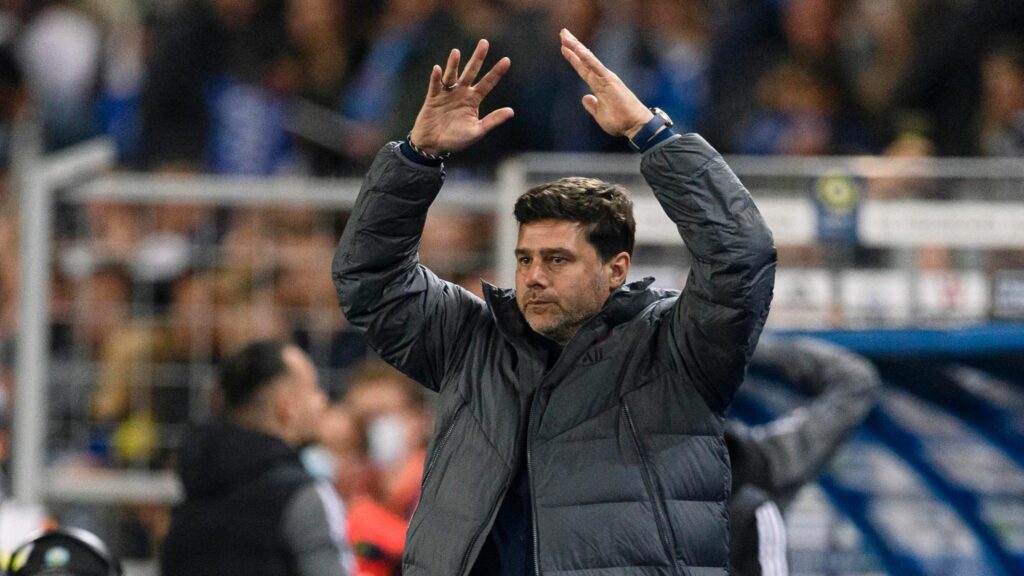Mauricio Pochettino is set to sign for Chelsea. While this is undoubtedly one of the most enticing jobs in football management, it’s also one of the toughest. Do Pochettino’s philosophy and tactics even fit The Blues?
Today I’m looking at Mauricio Pochettino’s favored tactical setup. He used these things while at Espanyol, Tottenham, and, more recently, at Paris Saint-Germain. And, I’ll be trying to answer whether the Argentine is likely to succeed back in the Premier League.
Is Pochettino the right man for the Chelsea job?
Mauricio Pochettino is rated as one of the best football managers in the world. Is that reputation entirely warranted? I’m not sure that it is yet.
Espanyol played some thrilling football but was hardly a European force. He built something exciting at Tottenham, but reaching the Champions League final was a fluke. And, even though he won a trophy at Paris Saint-Germain. he should’ve done more, given the quality of his squad.
The Chelsea job will be harder than all of these. Part of it is due to policies employed by new owner Todd Boehly.
However, should he succeed, Pochettino will rightfully be viewed as one of the best managers in the business.
Pochettino’s football philosophy
Mauricio Pochettino left London at the beginning of 2019. The project he developed at Tottenham seemed to spell out a vision that included trust in youngsters and clever use of transfer opportunities.
While unemployed for 14 months despite numerous offers, Pochettino decided not to accept them until finding his ideal opportunity arose – eventually landing as PSG manager, replacing Thomas Tuchel.
Pochettino has become widely renowned for his tactical acumen, particularly concerning his diamond-shaped attacking shape, high pressing, and using wing backs as part of the final third attack. Still, this would describe many modern-day managers’ tactics.
He used a 4-3-2-1 formation at PSG that shifted to a 4-4-2 in defense. The Parisians often sat in a mid-block against tougher opponents. Attackers, Neymar or Kylian Mbappe, would drop deep to get the ball. And Mbappe’s speed would be used for quick transitions.
While many fans adore his approach, some players found him overbearing towards the end of his tenure at Tottenham and Espanyol, leading some players to feel exhausted as time progressed. Furthermore, he had difficulty managing his egos in the PSG dressing room. However, this is something almost all managers in his situation struggled with.
Formation and tactics that Pochettino favors
Pochettino had the rare fortune of inheriting an established squad at Paris Saint-Germain when he took charge. This almost identical squad had reached the Champions League final last season with only minor tweaks required.
Pochettino knew his primary responsibility was producing results while building strong relationships among PSG stars. In other words, there was less squad building required than there will be at Chelsea.
Pochettino employed various formations during his time with PSG or Tottenham. He prefers a 4-2-3-1. This can easily become a 4-4-2 in defense or 4-2-2-2 in attack.
Pochettino has always preferred an aggressive style of play that emphasizes pressing high up the pitch, employing diamond shapes in attacking build-up and using wingbacks in the final third to create attacking opportunities.
At Espanyol and Tottenham, respectively, he preferred playing a 4-2-3-1 formation with high-intensity pressing and energy play, encouraging players to pass forward whenever possible – this helped both clubs secure top-four finishes within their respective leagues.
At Chelsea, he’ll have quick forwards like Raheem Sterling, technical ones like Kai Havertz, as well as an exceptional regista in Enzo Fernandez. However, he’ll need to work hard to reply his principles.
Chelsea in attack
Mauricio Pochettino has become known for adapting his tactics based on the opponents that his team faces. It’s likely he’ll attempt to do the same at Chelsea. This, at the moment, makes sense particularly given the sheer number of players the Londoners have in their squad.
It’s likely that Pochettino will like to assess his opponents and devise tactics accordingly. Like at PSG, Pochettino may utilize diamond formation with full-backs pushing up front to create width when in possession – an approach designed to foster passing options and open more attacking opportunities – but will remain flexible enough to alter his tactics as necessary to achieve optimal results.
Still, once again, it has to be said that these are not revolutionary approaches. At the time of writing, Frank Lampard’s Chelsea has lost every single game. Lampard has used a 3-4-2-1 approach that favored high pressing, quick transitions, and width.
The first thing that Pochettino will need to change is the Chelsea players’ mentality.
Chelsea’s defense
Pochettino’s minor success at Paris Saint-Germain (PSG) has demonstrated his ability to mold teams around his preferred tactics as well as an ability to adapt his high-tempo style to the players he has at his disposal.
If Pochettino becomes Chelsea’s next manager, we can anticipate similar strategies being employed by his players. They could press high and play at an aggressive tempo to create turnovers and scoring chances. However, such an approach can leave them vulnerable to counter-attacks.
It’s likely that he’ll take advantage of Raheem Sterling’s speed and experience. Pierre-Emerick Aubameyang looks like a player that can benefit from working with Pochettino. Noni Madueke’s speed and youthful exuberance will get him noticed.
However, players like Havertz, Mykhailo Mudrick, or Joao Felix are unlikely to make an impression on Pochettino unless they make dramatic changes to their training and playing.
Pochettino’s proven track record and tactical vision make him an attractive option for Chelsea despite any associated risks. Should he replicate what was achieved at Tottenham, we could witness Chelsea play exciting and intense football under his guidance.
A changed team under Pochettino?
Pochettino inherits a Chelsea team performing very poorly. But he also gets an extraordinary, if bloated, squad. He did not have the same options while at Tottenham, of course.
While his reputation is tremendous, the Argentine hasn’t yet achieved great success. If he’ll be given time and the authority to radically change the club’s setup, there’s no reason why Pochettino’s tactics for Chelsea won’t be winning ones.














